Summer 2020
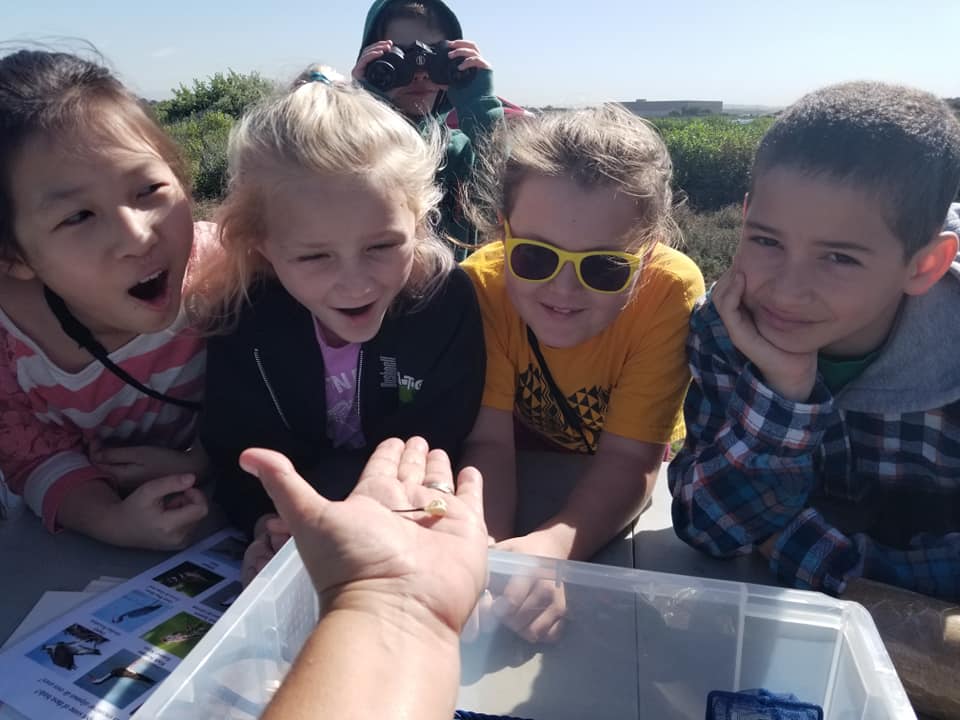
Dear Friends and Supporters,
Despite the challenges posed by the pandemic, the EDI team is keeping very busy this summer. Since we are unable to offer in-person programming, we have been exploring new and rewarding opportunities to connect with all of you remotely. We are working with longtime community partners to continue engaging young people in the outdoors, both inside and outside the classroom. We have also launched a new project to promote the conservation of the Western Monarch Butterfly and its habitat in San Diego County. In the midst of it all, we are also delighted to announce that we have hired a new Executive Director to join our team!
Connecting Kids with Nature
The pandemic has forced educators to shift from in-person classroom learning to distance learning, almost overnight. EDI has been working with classroom teachers to adapt our own programming to this new model, ensuring kids in the underserved communities that we typically serve continue enjoying opportunities to connect with nature. Our Education Director, Vicky Bonnett, has been collaborating with Cajon Valley Union School District teacher, Michelle Hardin, to engage her 4th grade students in field lessons via Zoom. During one such lesson, students were able to "visit" the pond at Rancho Jamul Ecological Reserve to observe and learn about the different life stages of the Baja California Tree Frog. Together they spotted polliwogs, and even some froglets!

Education Director, Vicky Bonnet, inviting Ms. Hardin's class to "visit" Rancho Jamul Ecological Reserve.
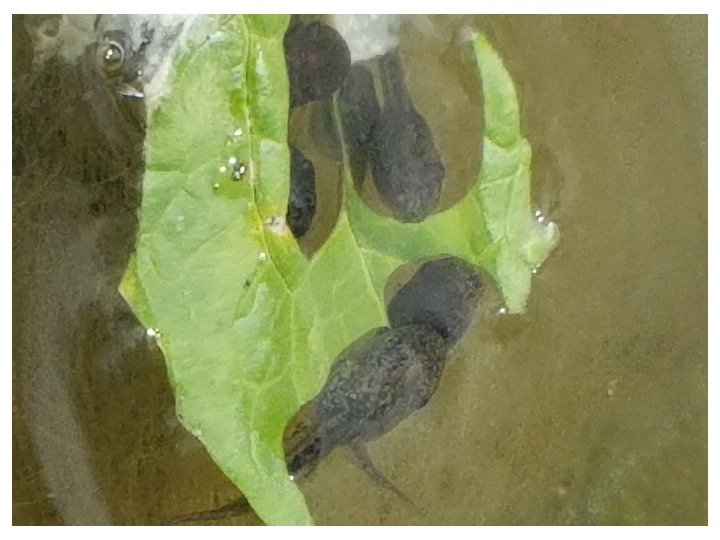
Polliwogs (aka tadpoles)!
iNaturalist and Seek "How to" Videos
We have teamed up with local videographer and EDI field instructor, Colin Richard, to develop a set of instructional videos on how to use iNaturalist and Seek phone apps. Do you ever wish you could easily identify an interesting plant you encounter on a hike? Try these apps! They instantly identify almost any plant species you are likely to encounter. They are both free, and super easy to use! Use iNaturalist if you would like your observations to contribute to citizen science. Seek was designed as an alternative to iNaturalist for children to use, but we have found it invaluable to people of all ages who simply want to know, "what is that?"
You can find links to both videos on our website.
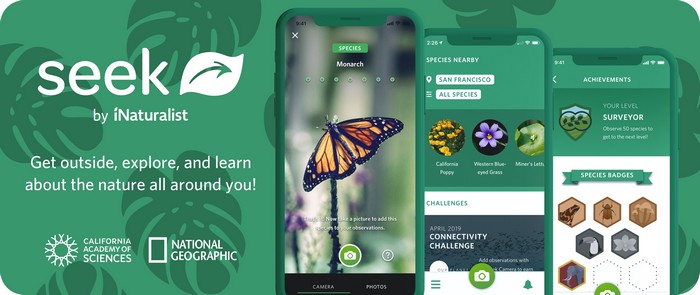
Plant of the Week
Every Wednesday, EDI Outreach Director and biologist Mary Duffy has been sharing some of her deep knowledge about native flora by posting beautiful photos and fascinating facts about a different “plant of the week,” on social media. Featured species have included matilija poppy, monkeyflower, canchalagua, wild lilacs and many more. She has also enjoyed answering your questions and admiring the photos you share of our native plants! Watch for these posts mid-week on Facebook page or follow us on Instagram @ediexplorers.
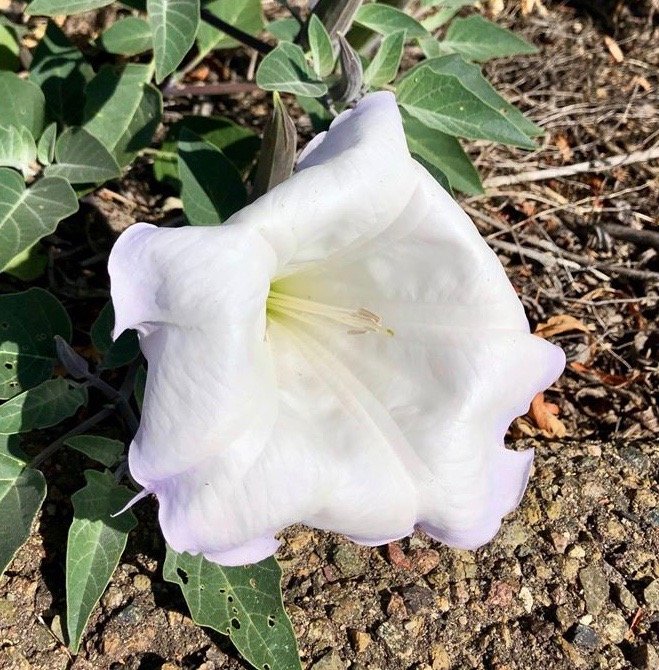
This week's plant is Datura wrightii, also known as jimsonweed, sacred thorn apple, toluca, tolguacha, moon lily, angel's trumpet and any number of names, is a potentially dangerous beauty native to the southwestern United States and Mexico.
These night-blooming plants must be pollinated in the dark. Sacred Datura flowers are pollinated by sphinx or hawk moths. These evening visitors can be seen feeding on the nectar of newly opened flowers. They are often mistaken for hummingbirds as they produce a soft "whir" or "buzz" and hover as they feed.
Datura enjoyed wide use among North American and Mesoamerican peoples. The Zuni people used the plant as an anesthetic for surgery and for ceremonial, magical, and divinatory purposes. The Chumash and other tribes used it for establishing contact with a supernatural guardian, as a personal talisman; to contact the dead, find lost objects, or see the true nature of people; and to cure the effects of injury, evil omens or breaches of taboo.

Datura was also the subject of one of Georgia O'Keeffe's most famous paintings.
Weekly Themed Scavenger Hunts
Education Director, Vicky Bonnett, has been creating a new activity every Friday to help guide the kiddos on a weekly nature exploration. Among her most popular is this word search for things one might find at the Crestridge Ecological Reserve.

Western Monarch Butterfly Conservation
Did you know that milkweed (Asclepias spp.) is the only host plant for caterpillars of Monarch Butterflies? Monarch butterfly populations are crashing, especially in CA where they number less than 1% of the population recorded in the 1980's. This is in part because milkweed, the plant upon which Monarchs depend during the early stages of their lifecycle, is also declining.
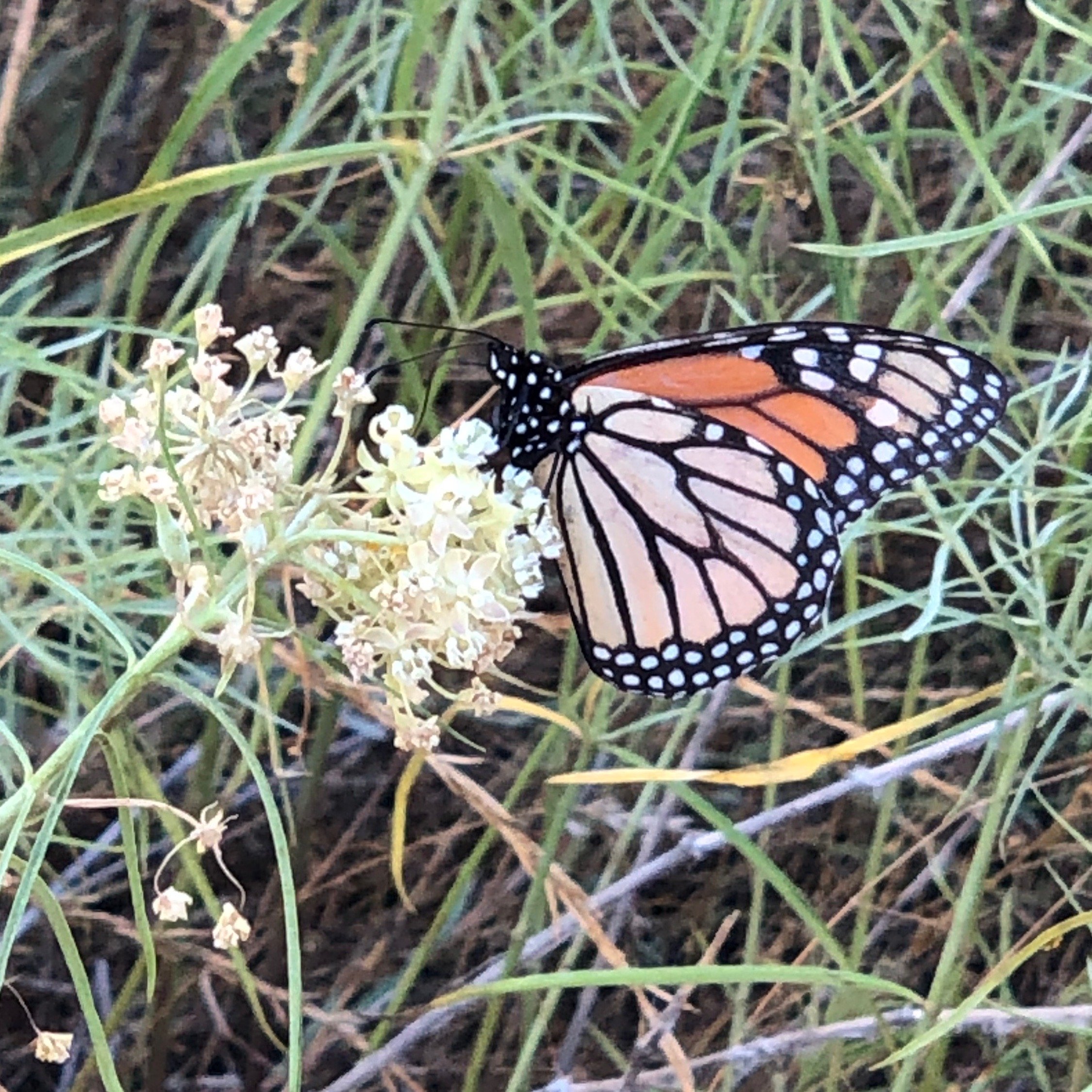
Unfortunately, most of the milkweed available to purchase here in CA is of the tropical variety. Feeding on this non-native species actually contributes to the decline of Monarch populations because:
1. It disrupts their natural migration patterns by causing them to remain at an artificially available food source instead of continuing to migrate;
2. It causes an accumulation of a debilitating protozoan parasite (Ophryocystis elektroscirrha) in their bodies.
3. The pesticides used on milkweed purchased from box-store nurseries build up in the larvae as they eat the milkweed, eventually weakening and often killing them as they morph into butterflies.
To help rescue this iconic species from extinction, EDI has begun a new initiative to grow a seed bank farm of *native* Narrowleaf Milkweed (Asclepias fascicularis) in San Diego County. The goal is to produce enough locally sourced milkweed seed to distribute to schools, communities, and other growers throughout the county. Environmental education about our unique populations of western milkweed and Monarchs will accompany the effort. Stay tuned to our website and social media for updates on this exciting new project!
Many thanks to our partners at San Diego Pollinator Alliance, Butterfly Farms, and Malk Fund for helping to make this happen.
Announcing our new Executive Director!

Earth Discovery Institute is pleased to announce the hiring of Sarah Maisonneuve to the position of Executive Director.
Sarah brings fresh energy and a world of experience to EDI. She has spent more than a decade developing and managing science-based education programs, as well as ecological research and conservation projects around the globe. A Colorado native, she has worked in a variety of contexts and ecosystems, from urban forests in Boston, MA, to agricultural communities in eastern Colorado and rural villages in east Africa. Ten years ago, while conducting fieldwork for her PhD in Ecology in Ruaha National Park, Tanzania, Sarah founded a non-profit dedicated to protecting elephants and improving human livelihoods. Sarah believes passionately in the importance of connecting people with nature for the benefit of both, and she is especially focused on ensuring people from traditionally under-resourced communities share in those opportunities.
Despite the pandemic and limitations of doing outdoor education and outreach in these uncertain times, Sarah is eager to get to know the partners and communities served by EDI. I encourage you to reach out to Sarah and introduce yourself and share your vision for the future of environmental education and outreach at sarah@earthdiscovery.org.
The board and staff at EDI are excited and honored to have Sarah join EDI's team as Executive Director.
- Michael Beck, Board President



